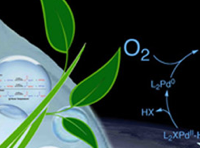This post is an extract from an interview with Shannon Stahl, Professor of Chemistry at the University of Wisconsin-Madison. This section highlights the differences for people of faith in different branches of science.
Chemistry is not at the interface of the usual tension spots between science and faith, so the idea of integrating faith and science is not as tangible to me as it is, for example, for the astrophysicist or the biologist. I am more concerned with how my faith relates to all of the principles of living life as a Christian: how I treat my co-workers and colleagues, integrating my family life with my career in a holistic way, and so on. All these things are very real, but it’s not the same as being a Christian and a biologist or an astronomer. One thing I’m well aware of is that, as a Christian working at a research institute, I can encourage young people that there’s some credibility about being a scientist and a Christian.
My research focuses on the chemistry of oxygen (O2): we’re trying to harness the chemistry of oxygen to do useful things. One of the projects that we’re working on is being carried out in partnership with the pharmaceutical industry to develop environmentally benign ways of synthesising organic chemicals.
Funding is tight for scientists like myself at the moment. We might be tenured, but we need grants in order to do research. Our identity as scientists is on the line. So when I write grant proposals, there’s something about the process of defending my identity that pushes me to the limits of creativity, and is different from any other time for me as a scientist.
Whenever I write a major grant proposal I seem to experience a burst of creativity and inspiration where everything fits together. It’s as if I see the (chemical) world differently – everything fits together in a way that I never saw before. All of a sudden it just makes sense. I don’t deal with equations very much, but it’s as if I have an equation that describes everything. I used to say, ‘It’s like being one with the universe’. Recently I became aware of the Hebrew word for this: ‘shalom’ – where everything is at peace, or in harmony. There is something so beautiful about science and the way that, when you get that inspiration, everything fits and there is a sense of shalom. It’s otherworldly. For better or worse, it often happens in the moments of greatest stress!
I think what drives many of us to science is this beauty – this sense of awe and wonder when you come across a discovery. It’s very rare because there’s so much grunt work involved in the lab, but when all of a sudden things fit, you’re on a high, and that inspires you to keep going. For me, that’s an interface between science and something that’s spiritual, in a sense. Something that is bigger than myself has all of a sudden taken hold of me and lifted me up.
See part two of this interview here.





